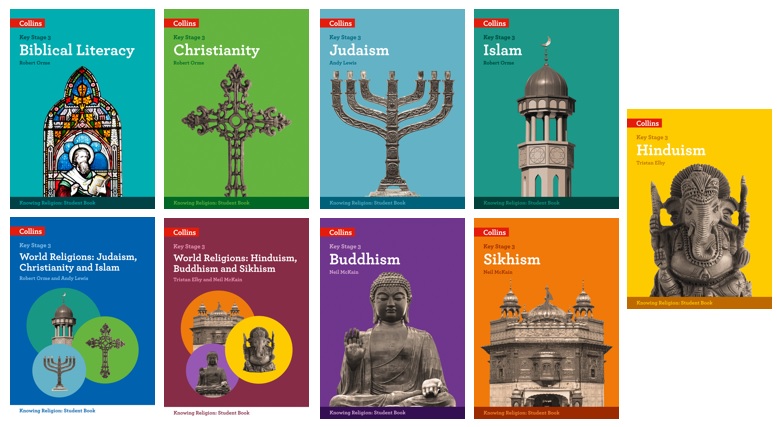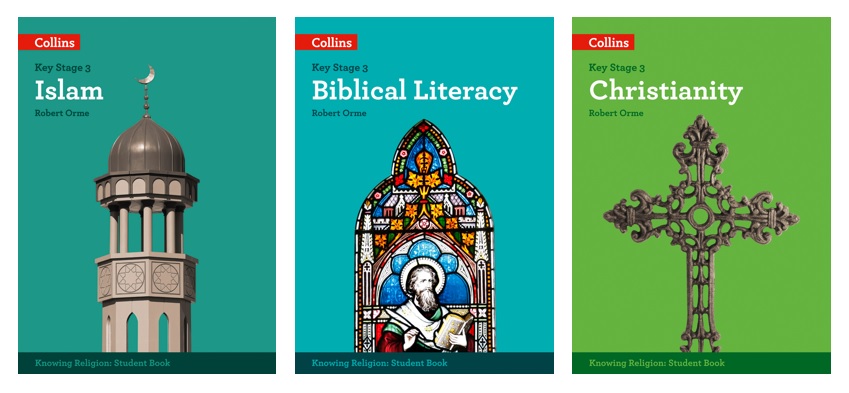Knowing Religion is a new series of nine Key Stage 3 RE textbooks. In this blog, we discuss the books with Series Editor and author of Islam, Christianity and Biblical Literacy, Robert Orme.
The new GCSE RS specifications first examined in 2018 offer teachers an exciting opportunity to review their KS3 curriculum ensuring it gives pupils a solid grounding for further study. With students examined on two religions at GCSE, Knowing Religion provides resources to support teachers in broadening and enriching their pupils’ understanding of a wider range of religions at KS3. The series can also help prepare pupils for the challenges of the new reformed GCSEs in three other key ways.
Challenge 1 – There’s so much to write!
One of the main changes at GCSE is that papers from all exam boards will now include 12 or 15 mark discursive questions requiring pupils to write for an extended period in response to a given statement about religion.

Throughout the Knowing Religion books, there are questions which require pupils to evaluate ideas and produce an extended and informed critical response to a statement. These offer an opportunity for pupils to learn how to structure extended writing and to develop greater fluency in their use of subject specific and analytical/evaluative language prior to GCSE.
There are five questions at the end of each double page in Knowing Religion. Alongside the more challenging discursive questions, there are questions which check understanding of key ideas, require synthesis of knowledge or assess analysis of content studied. All questions have been written in in a way that offers suitable preparation regardless of exam board chosen at GCSE.
Challenge 2 – There’s so much religious content!
With an increased amount of content in GCSE specifications, pupils who begin the GCSE course with prior knowledge of the religion they are going to study are likely to be at a clear advantage. The series includes a book for all religions that are available for study at GCSE, as well as a book on the Bible which gives pupils a broad and detailed understanding of the characters, stories, events and overarching narrative of the Christian Bible.

Key religious vocabulary is used throughout each Knowing Religion book. Each time a new word is introduced it is written in bold and defined in a key words box on that double page. It is then systematically revisited in later topics to reinforce understanding. Where appropriate, there is also consistency in the vocabulary and definitions used across the series so that pupils who study more than one religion can deepen their understanding of concepts by encountering them in differing contexts.
Beginning GCSE with a pre-existing understanding of key vocabulary and concepts is of inestimable gain. As cognitive psychologist Daniel Willingham has written, by committing key vocabulary to long term memory, pupils’ working memory is freed up to think more deeply about what they are studying. Not only does this make it possible for pupils to go into far greater depth at GCSE, it allows write with greater sophistication and fluency. All key words from the chapter are collected together in a Knowledge Organiser at the end of the chapter which can be given to pupils to help them consolidate their knowledge or revise. Pupils’ retention of knowledge can be checked using the free quizzes found in the Knowing Religion online teacher materials.
Challenge 3 – Context is key to significance
Sample GCSE questions for the reformed qualification frequently require pupils to explore the viewpoints of different groups within religions on various issues. However, during the course, pupils may be unlikely to explore how the religion developed its key ideas, why there are different groups/denominations within it and how these groups developed and their core distinctive beliefs that underpin viewpoints. In the case of Christianity, pupils who lack knowledge of the Salvation Army or Quakers except for these denomination’s view on war or gender are prone to a superficial understanding and to viewing the content they do learn as somewhat random. Furthermore, without context, it is very difficult for pupils to appreciate the significance of issues in a religion. It is the ability to form judgements on this that the new high mark questions require of pupils.
In response to this, each Knowing Religion book gives an overview of how the religion started, spread and split tying key ideas or beliefs into this narrative at relevant points. The second half of each book looks at some of the challenging questions or issues that each religion faces in the modern world. All of this background information provides a coherent framework to contextualise and deepen pupils’ understanding of what they learn at GCSE.
Take a closer look at Knowing Religion here: https://collins.co.uk/page/knowingreligion

Robert Orme




